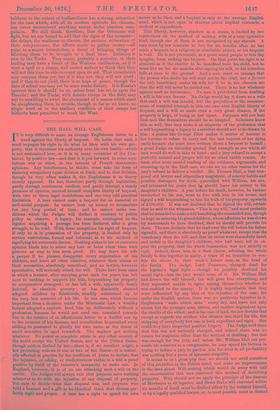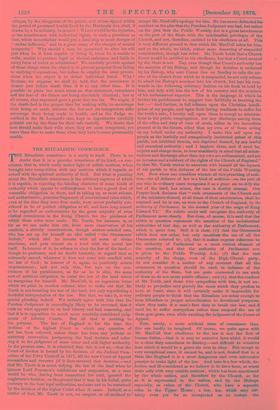THE HALL WILL CASE.
IT is very difficult to make an average Englishman listen to a word against the liberty of bequest. He holds that such a word impugns his right to do what he likes with his own pro- perty, that it threatens his authority over his own family—which is not maintained here, as it is in many countries of the Con- tinent, by positive law—and that it is put forward, in some mys- terious way or other, in the interest of French democratic opinions. Any interference, he thinks, must take the form of ensuring compulsory equal division at death, and to that division, though he very often makes it, the Englishman is in theory stoutly opposed. He has, therefore, partly through legislation, partly through continuous verdicts, and partly through a steady pressure of opinion, secured himself complete liberty of bequest, with two or three legal restrictions and one very odd practical limitation. A man cannot make, a bequest for an immoral or anti-social purpose; he cannot lock up money to accumulate for any long period of time ; and he cannot make con- ditions which the Judges will declare it contrary to public policy to observe. A legacy, for example, contingent on the legatee acquiring a peerage has been declared, after a great struggle, to be void. With these exceptions his right of bequest, if only he is in possession of the property, is limited only by certain restrictions, formal and informal, as to his method of signifying his autocratic decree. -Nothing either in law or executive opinion binds him to select any heir or heirs other than such persons as may to him seem good. He may leave his wife a pauper if he pleases, disappoint every expectation of his children, and leave all other relatives, whatever their claims or their necessities, absolutely unnoticed, and no lawyer, however speculative, will seriously attack the will. There have been cases in which a testator, after enjoying great rank for years, has left next to nothing to support his title, bequeathing his property to comparative strangers ; or has left a wife, apparently dearly beloved, in absolute poverty ; or has distinctly cheated adopted children by falsehoods, steadily maintained up to the very last moment of his life. In one case, which became important from a decision under the Mortmain Law, a wealthy lawyer adopted a nephew, bred him up deliberately without a profession, because he would not need one, remained towards him in the relation of an affectionate father to a dutiful son up to the moment of his decease, and nevertheless bequeathed every shilling he possessed to glorify his own name as the donor of small annuities to aged townsfolk. The nephew got nothing whatever. No power so complete exists in any other country of the world except the United States, and in the United States, though seldom limited by law—there is, if we recollect aright, a law protecting widows in-one or two of the States—it is materi- ally affected in practice by the readiness of juries to declare that the injustice, or oddity, or vindictiveness visible in a will is proof positive by itself of the testator's incapacity to make one. In England, however, it is of no use attacking such a will on the merits. 'The Judges will always rule that jurymen have nothing whatever to do with the injustice of any disposal of property, but only to decide what that disposal was, and jurymen who hold a bequest and a gift to be identical think that dictum per- fectly right and proper. A man has a right to spend his own
money as he likes, and a bequest is only to the average English mind, which is not open to theories about implied contracts, a method of expenditure.
This liberty, however, absolute as it seems, is limited by two restrictions on the method of making wills of a very operative kind, though one of them is not recognised by any statute. A man must by law continue to live for six months after he has made a bequest to a religious or charitable object, or his bequest is void. Re is not prevented, as a great many people to this day imagine, from making the bequest. On that point his right is as absolute as if the charity to be benefited were his child, but he
must live on for six months after signing his will, or his intention falls at once to the ground. And a man must so manage that the person who drafts his will shall not be the chief, nor a fortiori the only beneficiary under his will, for if he is, the chances are that the will will never be carried out. There is no law whatever against such an occurrence. No man is prohibited from drafting a will in his own favour. No Judge would lay it down as a rule that such a will was invalid, but the prejudices or the common- sense of mankind triumph in this one case over English liberty of bequest, and a will so made runs a very great chance, if the property is large, of being at last upset. Jurymen will not bear that men like themselves should be so tempted. Solicitors know this so well, that they make it an etiquette of the profession that a will bequeathing a legacy to a solicitor should not to be drawn by him ; a genius like George Eliot makes it matter of honour in her heroine to refuse to carry out the last request of her dying uncle because she must have written down a bequest to herself ; a great Judge on Saturday quoted that example as one which all men would do well to take to heart ; and a jury refused to accept a perfectly natural and proper will for no other visible reason. At least, after most careful reading of the evidence, arguments, and summing-up in the Hall case, we can see no other reason for the jury's refusal to deliver a verdict. Mr. Thomas Hall, a bad-tem- pered old lawyer and stipendiary maps' trate, of miserly habits and possible disrespect for truth, quarrelled with William, his son, and intimated for years that 110 should leave his money to his daughter's children. A year before his death, however, he became reconciled to his son, went to live with him in his house, and signed a will bequeathing to him the bulk of his property, upwards of 1100,000. It was not doubted that he signed the will, certain that he said to the witnesses, "This is my will," and most probable that he intended to make a will benefiting the reconciled son, though he kept on assuring his grandchildren, whose affection he was shown by memoranda to have doubted, that he should still provide for them. The son declares that he read over the will before his father signed it, and there is absolutely no proof whatever, except that the beneficiary drew the will, and that its terms were shamefully harsh and unfair to the daughter's children, who had been led to ex- pect the property, that the whole transaction was not strictly en regle. Indeed, there was, in a final clause, advising the whole family to live together in amity, a trace of an intention to con- fide the nieces to their uncle's future care, as the head of the family. The Judge, Lord Penzance, charged dead for the legatee's legal right — though he possibly doubted his moral right—but the jury would none of it. Mr. William Hall had drawn the will himself, the will gave him everything, and they separated unable to agree among themselves whether he was entitled to the money. It is highly improbable that they were influenced by any idea of the injustice of the case, for under the English system there was no particular injustice in it. Englishmen "make eldest sons" every day, and leave not only nieces, but the younger sons, sisters, and mother dependent upon the charity of the eldest; and in the case of land, the law decides that except as regards the mother, who obtains one-third for life, this stripping of everybody but one is both expedient and right. Nor could they have suspected positive forgery. The Judge told them that this was not seriously charged, and indeed there was no reason for suspicion other than the method of drafting; but that was enough for the jury, and unless Mr. William Hall can per- suade his relatives to a compromise, he may spend his fortune in trying to induce a jury to pardon him for what in all probability was nothing but a piece of ignorant stupidity. It seems to us a great pity that we should not avail ourselves of this prejudice in the British mind, and make an improvement in the laws about Will-making which would do away with half the uncertainties that now surround this method of devolving property. Why should not we apply the principle of the Statute of Mortmain to all legacies, and direct that a will executed within six months of death must be drafted either by the tatator himaelf, or by a legally qualified lawyer, or, to meet possible cases in distant
villages, by the clergyman of the parish, and unless signed within the period of presumed health fixed by the Mortmain Act, shall, if drawn by a beneficiary, be invalid ? Where would be the injustice, or the interference with individual rights, in such a provision as that, which nevertheless would put a final stop to most charges of "undue influence," and to a great many of the charges of mental incapacity ? Why should a man be permitted to alter his will just when he is least capable of doing it, when he is unable to write, unable to procure legal or clerical assistance, and liable to every form of terror or solicitation? We carefully provide against all those things when the object is to prevent property from falling to undying Corporations, but refuse to employ the same precau- tions when the object is to defeat individual fraud. Why ? Because, we suppose we shall be told, that the conscience is clearer just before death than it is at any other time. It is possible to place too much stress on that statement, conscience and the fear of the future not being absolutely identical ; but at all events, that argument goes a great deal too far. We ought, if the death-bed is the proper time for making wills, to encourage their being so made, whereas the law and its interpreters alike encourage their being made in health, and as the Judge re- marked in the St. Leonard's case, kept in depositories carefully pointed out by the State for their safe custody. We desire that men should make their wills when they are most competent, yet leave them free to make them when they have become presumably unable.



































 Previous page
Previous page